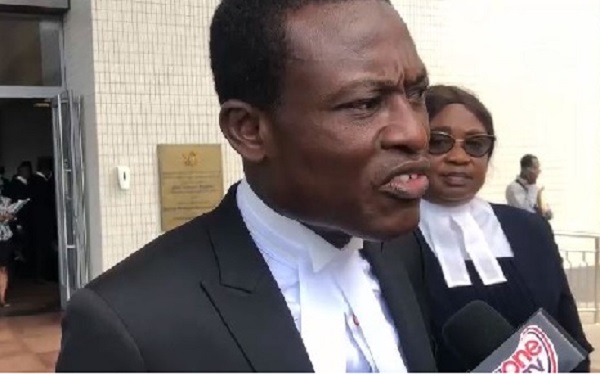Pressure group, OccupyGhana is seeking legal advise on how it can compel the Special Prosecutor to disclose the name of the said Ghanaian rich businessman who reportedly attempted to bribe some members of the Majority caucus in Parliament during their agitation in 2022, for the Finance Minister, Ken Ofori-Atta to resign or be sacked.
”We have instructed our lawyers to advise whether we and Ghanaians have the constitutional right to information, to the name of the businessman, which the OSP inexplicably redacted from the report. If we receive advice that we are entitled to that information, we will commence the relevant proceedings under the Right to Information Act to compel the OSP to reveal the name,” the group said in a press statement issued on Friday, January 6, 2024.
The Office of Special Prosecutor (OSP) in its report on the investigation into alleged attempted bribery of members of the majority caucus of the Parliament of Ghana said even though witnesses which appeared before investigators did not disclose the name of the said businessman, the OSP on its own was able to get information and the name of the said wealthy businessman.
However, its report, the OSP did not disclose the name of the said businessman.
Read also: Attempted bribery of MPs in majority caucus, OSP ends investigations for lack of cooperation
Attached below is a copy of the press statement by OccupyGhana reacting to the OSP's report
OCCUPYGHANA PRESS RELEASE
Accra, 5 January 2024
Re: REPORT OF INVESTIGATION INTO ALLEGED ATTEMPTED BRIBERY OF A SECTION OF THE MAJORITY CAUCUS OF PARLIAMENT
OccupyGhana has read with much disappointment, the report of the Office of the Special Prosecutor (‘OSP’) on the above, dated 28 December 2023. The OSP’s investigation was triggered by our 3 November 2022 petition to that office to investigate the alleged, attempted bribery of the majority caucus of Parliament by an unnamed businessman. This was after both Andy Appiah-Kubi, MP and Osei Kyei-Mensah Bonsu, MP, Majority Leader and Minster for Parliamentary Affairs, had taken turns to make these allegations.
That is why we find shocking the claim by the otherwise respectable Kyei-Mensah Bonsu, MP that the only bases of his allegations, were rumours and Appiah-Kubi, MP’s allegations. We find it difficult to believe that with all the resources at his disposal, the Majority Leader and Minister would trot out and repeat allegations that he now say he did not verified either beforehand or after-the-fact. Then there is the reported hostility by Appiah-Kubi, MP towards officers of the OSP and his flat-out refusal to cooperate with the investigation. What is even more shocking is the report that both Appiah-Kubi, MP (the accuser) and the unnamed businessman (the accused) apparently engaged in a ‘rehearsed and well-choreographed… joint and similar denial’ of the attempted bribery event.
The result is that the OSP could not obtain any prosecution-worthy evidence on yet another allegation of corruption involving Parliament, an institution which has been plagued by and dogged with several corruption allegations over the years. Although there have been no charges or prosecutions, the repeated allegations that MPs engage in various acts of corruption is not one that Ghanaians can ignore. Some derisorily, and maybe with some justification, refer to our Parliament as ‘Ghana’s leading transactional centre.’
From time to time, some MPs end up confessing that these shenanigans happen. While examples are legion, there has been one assured result – investigations lead to nothing. For example, in 2014, Alban Bagbin (then MP and now Speaker of the House) was reported to have admitted that ‘there is evidence that some MPs take bribes and come to the floor and try to articulate the views of their sponsors.’ As expected, a reported parliamentary inquiry led to nothing. In 2017, some minority MPs on the Appointments Committee, led by Mahama Ayariga, MP, reported an attempt to bribed them to approve a ministerial nominee. Another reported parliamentary enquiry led to nothing, as expected.
This time, two senior sitting MPs took turns to announce on radio that an unnamed rich businessman attempted to bribe a section of Parliament’s majority caucus. These MPs are considered as heavy weight leaders in our politics, and the least expected of them are dignity and the courage to stand by their convictions, if they have any. They ought to be good examples for the rest of us and our children. Yet, their behaviour renders them unfit to be leaders. One would have expected them to resign in good conscience, but alas, we are stuck with such mediocrity.
As the OSP indicated in the report, the case is all but dead for lack of serious evidence to prosecute; but these ‘Honourable MPs’ (a phrase that is now generally accepted and understood as an oxymoron) will continue to occupy their seats and offices, and earn their salaries and even ex gratia, not caring about the damage they are causing to this country.
But we are not done yet. We have instructed our lawyers to advise whether we and Ghanaians have the constitutional right to information, to the name of the businessman, which the OSP inexplicably redacted from the report. If we receive advice that we are entitled to that information, we will commence the relevant proceedings under the Right to Information Act to compel the OSP to reveal the name.
Corruption, like fungi, thrives in darkness and shadows, taking advantage of secrecy, self-imposed redactions, unjustified self-censorship and lack of accountability. The corruption fungus abhors and cannot stand sunlight, and we will do all in our civil power to direct the power of light unto this matter. It just might produce the further evidence that the OSP requires to revive the dead.
![]()
![]()


